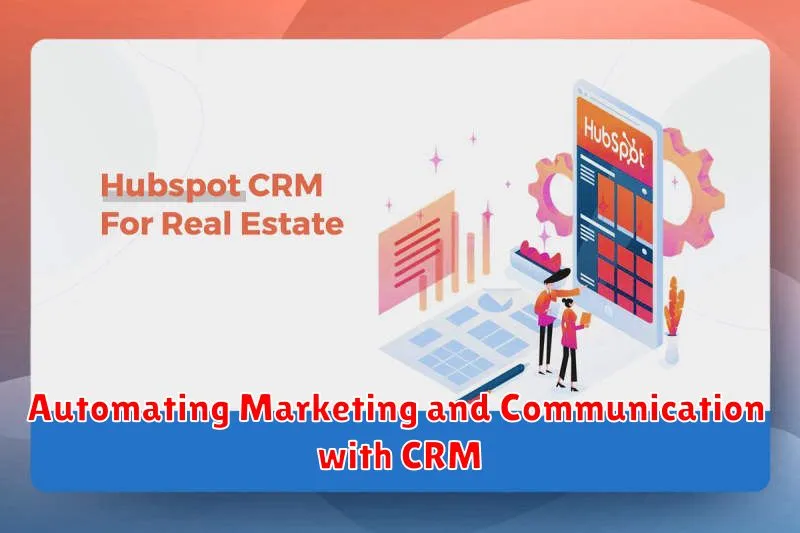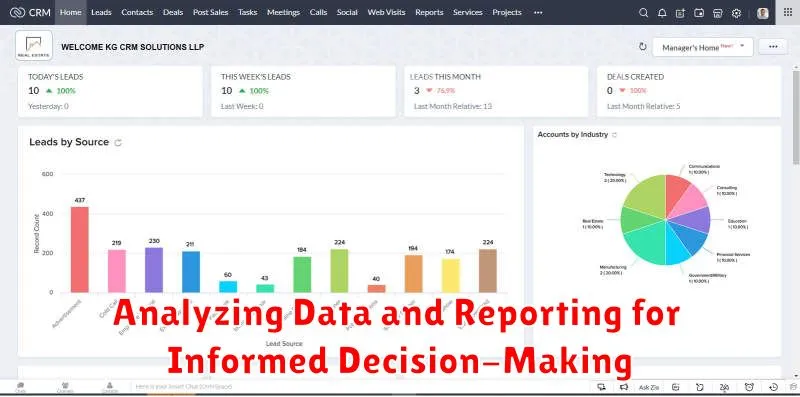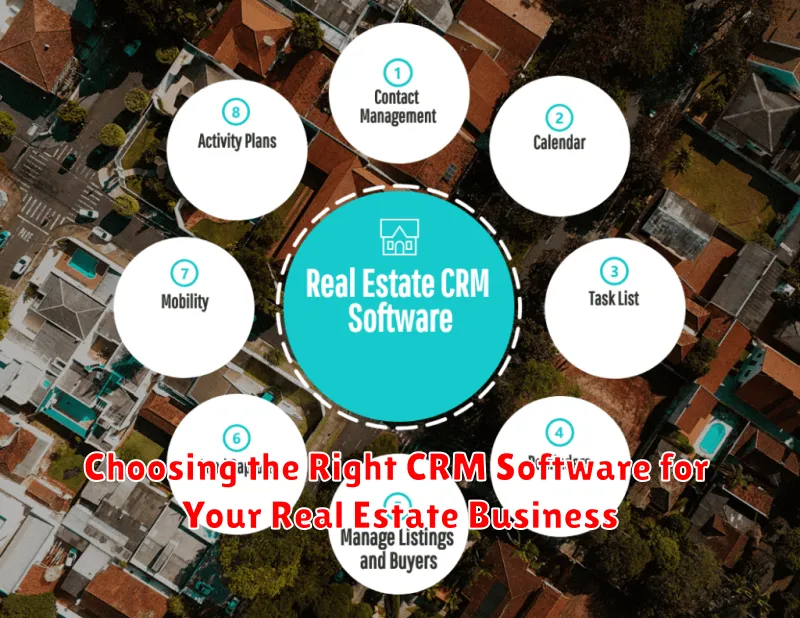In today’s competitive real estate market, having a robust CRM software is no longer a luxury but a necessity. A good CRM solution can help real estate agents and brokers manage leads effectively, automate tasks, and ultimately, close more deals. But with so many different CRM options available, how do you choose the right one? This article will guide you through the essential features to consider when selecting a CRM for your real estate business, helping you find the perfect tool to streamline your operations and boost your success.
The Benefits of CRM Software for Real Estate Professionals
In today’s competitive real estate market, it’s more important than ever for professionals to have the right tools to stay organized, efficient, and connected with clients. CRM software (Customer Relationship Management) can be a game-changer for real estate agents and brokers, providing a centralized hub for managing leads, nurturing relationships, and streamlining business processes.
Enhanced Lead Management
One of the biggest benefits of CRM software is its ability to streamline lead management. With a centralized system, agents can easily track all their leads, their sources, and their interactions. This eliminates the need to juggle multiple spreadsheets or rely on unreliable memory.
Automated Marketing & Communication
CRM software often comes with built-in marketing and communication tools. Agents can automate email campaigns, send personalized messages, and schedule follow-ups, ensuring that leads stay engaged and informed throughout the buying or selling process.
Improved Client Relationships
By providing a comprehensive view of client interactions and preferences, CRM software helps agents build stronger relationships. This leads to increased client satisfaction, loyalty, and ultimately, more referrals.
Enhanced Productivity & Efficiency
With CRM software, real estate professionals can save time and effort by automating tasks, eliminating manual data entry, and accessing information quickly. This frees up time for agents to focus on what matters most: building relationships and closing deals.
Data-Driven Insights
CRM software provides valuable data and analytics that can help agents identify trends, measure performance, and make informed business decisions. This data can be used to optimize marketing campaigns, improve customer service, and maximize profitability.
Conclusion
Implementing CRM software can be a strategic investment for real estate professionals. By leveraging the power of this technology, agents can boost their productivity, strengthen client relationships, and gain a competitive edge in today’s demanding market.
Essential CRM Features for Managing Leads Effectively
In today’s competitive business landscape, managing leads effectively is crucial for achieving success. A robust Customer Relationship Management (CRM) system plays a vital role in this process. By centralizing all your customer interactions, a CRM empowers you to nurture leads, streamline sales pipelines, and ultimately convert them into loyal customers. Here are some essential CRM features that will help you manage your leads effectively:
Lead Capture and Management
The first step in managing leads effectively is capturing them. Your CRM should provide a comprehensive lead capture system that allows you to collect essential information such as name, email address, phone number, company, and industry. Once captured, leads should be organized into a centralized database for easy access and management.
Lead Scoring and Prioritization
Not all leads are created equal. Some leads are more likely to convert than others. A powerful CRM system will allow you to score leads based on specific criteria such as engagement level, website activity, and demographics. This scoring system helps you prioritize your outreach efforts and focus on the most promising leads.
Lead Nurturing and Automation
Nurturing leads is crucial for building relationships and converting them into customers. A CRM should offer automated lead nurturing campaigns that deliver personalized content and communication based on their interests and engagement levels. This can include email sequences, automated social media interactions, and targeted website content.
Sales Pipeline Management
Your CRM should provide a clear and comprehensive view of your sales pipeline, allowing you to track the progress of your leads at every stage. You should be able to easily identify bottlenecks, track key performance indicators (KPIs), and make data-driven decisions to improve your sales processes.
Reporting and Analytics
Data is the lifeblood of any successful sales strategy. A CRM system should provide robust reporting and analytics capabilities, allowing you to gain valuable insights into lead behavior, campaign performance, and overall sales trends. This data can then be used to optimize your sales processes and maximize conversion rates.
Integration with Other Tools
To maximize your CRM’s effectiveness, it should be able to integrate seamlessly with other essential business tools, such as email marketing platforms, social media tools, and your website. This integration ensures a unified data flow and streamlines your operations.
By implementing a CRM system with these essential features, you can significantly improve your lead management capabilities. This will enable you to nurture relationships, optimize your sales processes, and ultimately achieve your business goals.
Automating Marketing and Communication with CRM

In today’s digital age, businesses are constantly looking for ways to streamline their operations and improve efficiency. One area where automation can make a significant impact is in marketing and communication. By leveraging a Customer Relationship Management (CRM) system, companies can automate many tasks, freeing up valuable time for strategic initiatives.
A CRM system acts as a central hub for all customer data, providing a comprehensive view of each interaction. This data can be used to personalize marketing campaigns, automate email sequences, and generate targeted content. For example, a CRM can automatically send welcome emails to new customers, trigger follow-up messages after a purchase, or provide personalized recommendations based on browsing history.
One of the key benefits of CRM automation is the ability to personalize customer experiences. By understanding customer preferences and behavior, businesses can tailor their messages and offers to individual needs. This level of personalization can lead to higher engagement, improved customer satisfaction, and ultimately, increased sales.
Moreover, CRM automation can help businesses save time and resources. By automating routine tasks such as lead nurturing, email marketing, and appointment scheduling, teams can focus on more strategic activities, such as building relationships and developing new products or services.
In conclusion, CRM automation is a powerful tool that can significantly enhance marketing and communication efforts. By leveraging the capabilities of a CRM system, businesses can automate tasks, personalize customer experiences, and improve overall efficiency. This can lead to stronger customer relationships, increased revenue, and a more successful business.
Tracking Property Listings and Client Preferences
In the dynamic world of real estate, staying organized and efficient is crucial. Managing property listings and client preferences simultaneously can be a challenging task, but with the right tools and strategies, it becomes a breeze.
Creating a Centralized Database
A robust database is the foundation of a well-organized real estate business. A centralized system allows you to store and access information quickly and efficiently. Consider using a spreadsheet or a dedicated real estate software program. Ensure your database includes:
- Property details: Address, square footage, number of bedrooms and bathrooms, features, pricing, and photos.
- Client information: Name, contact details, desired property type, budget, preferred location, and any other specific requirements.
- Communication logs: Track all interactions with clients, including emails, phone calls, and meetings.
- Property updates: Note any changes to listings, such as price reductions or availability status.
Utilizing Technology
Technology is your ally in streamlining real estate operations. Numerous tools can help you manage listings and client preferences effectively:
- CRM (Customer Relationship Management) Software: CRM software helps you organize client contacts, track communication, and manage leads. Some popular options include Salesforce, Zoho CRM, and Pipedrive.
- Real Estate Listing Websites: Platforms like Zillow, Realtor.com, and Trulia allow you to showcase your listings to a wider audience and track viewing statistics.
- Property Management Software: Software like AppFolio and Buildium can assist with property management tasks, including rent collection, tenant communication, and maintenance requests.
Developing Effective Communication Strategies
Clear and consistent communication is vital in maintaining strong client relationships. Implement these strategies:
- Regular Updates: Keep clients informed about new listings that match their preferences.
- Personalized Communication: Tailor your messaging to individual client needs and preferences.
- Prompt Responses: Respond to client inquiries promptly to demonstrate professionalism and dedication.
Conclusion
Tracking property listings and client preferences effectively is crucial for real estate success. By implementing the strategies outlined above, you can streamline your workflow, optimize your time, and enhance client satisfaction. Remember, staying organized and leveraging technology can make a significant difference in achieving your real estate goals.
Managing Client Interactions and Appointments
In today’s fast-paced business environment, managing client interactions and appointments effectively is crucial for success. Efficiently scheduling appointments, handling inquiries, and nurturing relationships with clients can significantly impact your business growth and profitability. This article will explore essential strategies for managing client interactions and appointments to optimize your workflow and enhance client satisfaction.
Utilizing Appointment Scheduling Software
Appointment scheduling software is an indispensable tool for streamlining your appointment management process. Features like online booking, automated reminders, and calendar integration can save you valuable time and reduce the likelihood of missed appointments. Consider software that allows for customized appointment types, duration, and availability settings to tailor the system to your specific needs.
Effective Communication Channels
Maintaining open and consistent communication with your clients is vital. Establish clear communication channels, including email, phone, and instant messaging, to ensure prompt responses to inquiries. Consider using a customer relationship management (CRM) system to centralize client information and communication history for a more cohesive experience.
Prioritizing Client Feedback
Actively soliciting and responding to client feedback is crucial for continuous improvement. Regularly ask for client opinions through surveys, feedback forms, or personalized interactions. Use this feedback to refine your services, address any concerns, and enhance the overall client experience.
Building Strong Client Relationships
Building lasting relationships with clients goes beyond simply fulfilling appointments. Show genuine interest in their needs and goals. Offer personalized solutions, provide exceptional customer service, and stay connected with clients even after appointments. Consider sending follow-up emails, birthday greetings, or informative newsletters to maintain ongoing engagement.
Conclusion
Managing client interactions and appointments effectively is a continuous process. By utilizing the right tools, implementing clear communication strategies, and prioritizing client feedback, you can build strong relationships, enhance client satisfaction, and drive business growth. Remember, happy clients are the foundation of a thriving business.
Integrating CRM with Other Real Estate Tools
In today’s competitive real estate market, agents need every advantage they can get. One way to streamline operations and improve efficiency is by integrating your CRM with other real estate tools. This can help you manage your leads, schedule appointments, track your progress, and ultimately close more deals.
Benefits of Integrating CRM with Other Real Estate Tools
There are many benefits to integrating your CRM with other real estate tools, including:
- Improved lead management: By integrating your CRM with your lead capture tools, you can automatically add new leads to your CRM and start nurturing them right away. This can help you avoid losing leads and ensure that you’re following up with them in a timely manner.
- Enhanced communication: Integrating your CRM with your email marketing and SMS marketing tools can help you stay in touch with your clients and keep them updated on new listings, market trends, and other relevant information.
- Streamlined scheduling: By integrating your CRM with your scheduling tools, you can easily schedule appointments and keep track of your calendar. This can help you avoid double-booking and ensure that you’re always on top of your schedule.
- Automated tasks: Many CRM integrations can automate tasks like sending follow-up emails, generating reports, and creating marketing campaigns. This can free up your time so that you can focus on other aspects of your business.
- Better data insights: When you integrate your CRM with other real estate tools, you can gain valuable insights into your clients’ behavior, market trends, and your own performance. This data can help you make better business decisions and improve your marketing efforts.
Types of Real Estate Tools to Integrate with Your CRM
There are many different types of real estate tools that you can integrate with your CRM. Some of the most popular options include:
- Lead capture tools: These tools help you collect leads from your website, social media pages, and other online sources.
Examples: Leadpages, Instapage, landing pages, or signup forms.
- Email marketing tools: These tools help you send email newsletters, drip campaigns, and other automated emails to your clients.
Examples: Mailchimp, Constant Contact, SendGrid, or ActiveCampaign
- SMS marketing tools: These tools help you send text messages to your clients.
Examples: Twilio, Nexmo, or TextMagic.
- Scheduling tools: These tools help you schedule appointments and manage your calendar.
Examples: Calendly, ScheduleOnce, or Acuity Scheduling.
- Real estate listing platforms: These platforms allow you to list properties for sale or rent.
Examples: Zillow, Realtor.com, Redfin, Trulia, or Homes.com.
- Real estate analytics tools: These tools provide you with data and insights into the market.
Examples: Reonomy, CoreLogic, or PropertyShark.
Tips for Choosing and Implementing CRM Integrations
When choosing and implementing CRM integrations, it’s important to keep the following tips in mind:
- Consider your specific needs: Before you start looking for integrations, take some time to think about what your specific needs are. What types of tasks do you want to automate? What types of data do you want to track? What types of reports do you need?
- Choose integrations that are compatible with your CRM: Not all integrations are compatible with all CRM systems. Make sure that the integrations you choose are compatible with your CRM and that they have the features you need.
- Test the integrations before you go live: Once you’ve chosen your integrations, it’s important to test them thoroughly before you go live. This will help you ensure that they’re working properly and that they’re meeting your needs.
- Get your team on board: It’s important to get your team on board with the CRM integrations. Make sure they understand how the integrations work and how they can use them to improve their efficiency.
- Monitor the integrations and make adjustments as needed: Once you’ve implemented the CRM integrations, it’s important to monitor them regularly and make adjustments as needed. This will help you ensure that the integrations are continuing to meet your needs and that they’re working efficiently.
Conclusion
Integrating your CRM with other real estate tools can help you streamline your operations, improve your efficiency, and ultimately close more deals. By following the tips above, you can choose the right integrations for your business and make the most of these powerful tools.
Analyzing Data and Reporting for Informed Decision-Making

In today’s data-driven world, the ability to analyze data and report findings effectively is paramount for organizations seeking to make informed decisions. Data analysis provides valuable insights that can drive strategic planning, improve operational efficiency, and enhance customer experiences. By harnessing the power of data, businesses can gain a competitive edge and navigate complex challenges with confidence.
Data Analysis Process
The data analysis process typically involves several key steps:
- Data Collection: Gathering relevant data from various sources, including databases, surveys, and social media.
- Data Cleaning and Preparation: Ensuring data quality by addressing inconsistencies, missing values, and formatting issues.
- Data Exploration and Visualization: Identifying patterns, trends, and outliers using statistical techniques and data visualization tools.
- Data Modeling and Analysis: Applying statistical models and algorithms to uncover relationships and insights.
- Reporting and Communication: Presenting findings in a clear and concise manner using dashboards, reports, and presentations.
Benefits of Data Analysis and Reporting
Effective data analysis and reporting offer numerous benefits, including:
- Improved Decision-Making: Data-driven insights provide a foundation for informed decisions, reducing risk and maximizing outcomes.
- Enhanced Operational Efficiency: Identifying bottlenecks and areas for improvement in business processes, leading to increased productivity and cost savings.
- Better Customer Understanding: Gaining insights into customer preferences, behaviors, and needs, enabling organizations to provide personalized experiences and targeted marketing campaigns.
- Competitive Advantage: Utilizing data analytics to stay ahead of the competition by anticipating market trends and adapting to changing customer demands.
- Increased Revenue and Profitability: Optimizing pricing strategies, product development, and marketing efforts to drive sales and enhance profitability.
Conclusion
Data analysis and reporting are essential for organizations looking to thrive in today’s data-driven environment. By leveraging data effectively, businesses can make informed decisions, optimize operations, and gain a competitive advantage. Investing in data analytics capabilities is crucial for success in any industry.
Choosing the Right CRM Software for Your Real Estate Business

In the competitive landscape of real estate, having a robust Customer Relationship Management (CRM) system is essential for success. A CRM streamlines communication, tracks leads, and automates tasks, empowering you to nurture relationships and close deals efficiently. With numerous options available, choosing the right CRM software for your real estate business can feel overwhelming. This guide will delve into key considerations and features to help you make an informed decision.
Understanding Your Needs
Before diving into specific CRM solutions, assess your unique business requirements. Consider factors such as:
- Size of your team: Choose a CRM that can accommodate your current team size and future growth.
- Target audience: Understand the specific needs and preferences of your ideal clients.
- Budget: Determine your budget for CRM software and associated costs.
- Desired features: Identify essential features, such as lead capture, contact management, marketing automation, and reporting capabilities.
Essential Features for Real Estate CRM
A comprehensive real estate CRM should offer a range of features designed to streamline your workflow and boost productivity. Look for solutions that include:
- Lead Management: Efficiently capture, qualify, and nurture leads from various sources, including your website, social media, and referrals.
- Contact Management: Maintain detailed profiles of your clients, including contact information, communication history, and property preferences.
- Property Management: Track properties listed for sale or rent, manage showings, and monitor progress towards closing.
- Marketing Automation: Automate email campaigns, personalized messages, and follow-up sequences to nurture leads and stay top-of-mind.
- Reporting and Analytics: Gain insights into lead conversion rates, marketing campaign effectiveness, and sales performance.
Top CRM Software Options for Real Estate
The market offers a variety of CRM solutions tailored to the real estate industry. Some popular choices include:
- BoomTown: Known for its powerful marketing automation capabilities, BoomTown is a comprehensive CRM that helps you generate leads, nurture relationships, and manage transactions.
- Realvolve: This cloud-based CRM emphasizes ease of use and mobile accessibility, making it suitable for both individual agents and teams.
- Wise Agent: Wise Agent provides a user-friendly interface with features such as automated email sequences, lead capture forms, and detailed reporting.
- RE/MAX: For RE/MAX agents, the company’s exclusive CRM offers a suite of tools and resources for lead management, marketing, and transaction management.
Tips for Choosing the Right CRM
Consider these tips to make the most of your CRM evaluation process:
- Try free trials: Many CRM providers offer free trials, allowing you to test drive the platform before committing.
- Read user reviews: Seek feedback from other real estate professionals who have used the software.
- Request demos: Schedule demos with CRM vendors to see the platform in action and ask questions.
- Ensure integration: Verify that the CRM integrates with other essential tools, such as your website, email marketing platforms, and accounting software.
Conclusion
Investing in a robust CRM system is crucial for real estate professionals seeking to optimize their operations and elevate their business. By carefully evaluating your needs and considering the essential features listed above, you can choose the right CRM software to empower your success and build lasting relationships with your clients.
